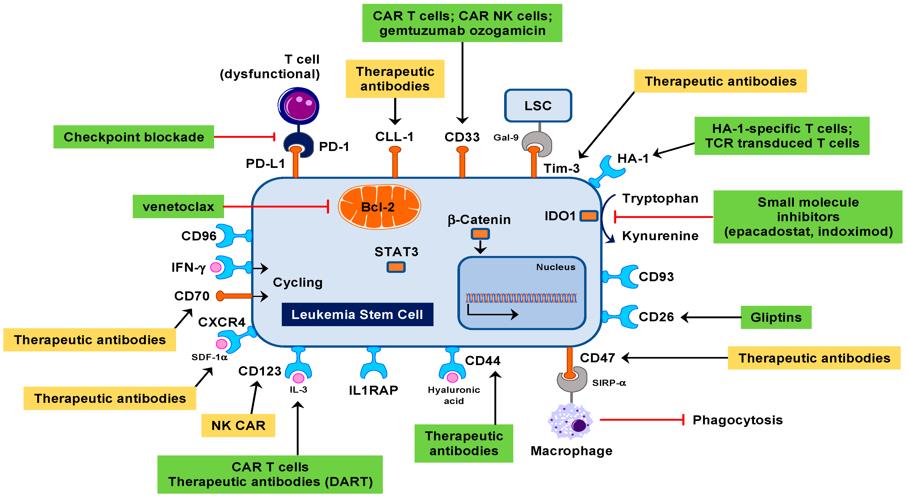Leukemia Cancer Stem Cell Markers
Related Symbol Search List
Immunology Background
Overview of Leukemia Cancer Stem Cell Markers
Leukemia is a malignancy caused by leukemic stem cells, which are highly heterogeneous and complex. In recent years, researchers have realized that leukemia stem cells play a crucial role in the etiology and progression of leukemia. Leukemic stem cell markers are molecules that are expressed in the process of mediating leukemic stem cell proliferation, differentiation, and interaction with the bone marrow microenvironment. Progress in the study of these markers not only contributes to an in-depth understanding of the biological properties and pathogenic mechanisms of leukemia stem cells, but also provides new targeting tools for clinical treatment.
 Fig.1 Actionable targets expressed in leukemia stem cells. (Tasian, S.K, et al., 2017)
Fig.1 Actionable targets expressed in leukemia stem cells. (Tasian, S.K, et al., 2017)
Research Areas of Leukemia Cancer Stem Cell Markers
- Characteristic markers of leukemia stem cells
Characteristic markers of leukemia stem cells are crucial for their identification and isolation. For example, the expression patterns of markers such as CD34, CD38, and CD123 are closely related to the clinical manifestations and prognosis of leukemia stem cells. Quantitative detection and analysis of these markers can help doctors determine treatment options and monitor disease progression and treatment effects.
- Research on leukemia stem cell-related regulatory pathways
The study of leukemia stem cell markers also involves regulatory pathways related to leukemia stem cells, such as Wnt signaling and Notch signaling, which play important roles in the proliferation and self-renewal of leukemia stem cells. Through the study of these regulatory pathways and their regulatory molecules, we can reveal the development mechanism of leukemia stem cells and the interaction between stem cells and their surrounding environment, and provide new ideas for leukemia treatment.
- Research on drug resistance mechanism
Leukemia stem cells are often drug-resistant, which is an important cause of leukemia relapse and treatment failure. Studying the drug resistance mechanism of leukemia stem cells from the perspective of markers can help find novel therapeutic targets against leukemia stem cells. For example, targeted therapeutic studies on leukemia stem cells expressing drug efflux proteins such as ABCG2, MDR1, and MRP1 are expected to overcome drug resistance and improve the effectiveness of cancer treatment.
In conclusion, the study of leukemia stem cell markers provides a strong support for us to deeply understand the characteristics and mechanisms of leukemia stem cells, and provides a new direction for the treatment and management of leukemia. With the continuous progress of science and technology, we believe that we can better cope with the challenge of leukemia through the in-depth study of leukemia stem cell markers and bring more hope to patients.
Reference:
- Tasian, S.K.; Bornhäuser, M.; Rutella, S. Targeting Leukemia Stem Cells in the Bone Marrow Niche. Biomedicines 2018, 6, 22. https://doi.org/10.3390/biomedicines6010022

